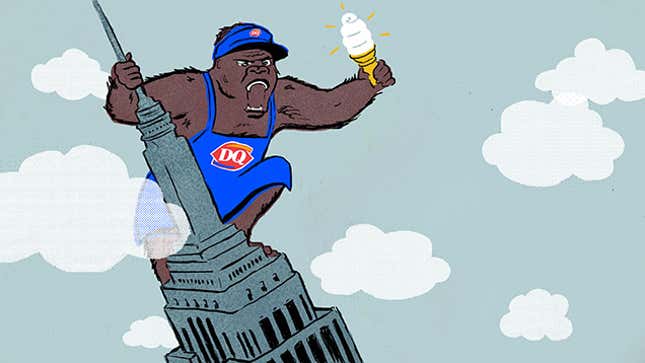
Manhattan's first Dairy Queen opened last month, its arrival heralded by months of agonizingly sincere public debate. Critics bemoaned the suburbanization of their precious city and exhorted responsible New Yorkers to patronize their nearest Mister Softee truck instead, rather than feed the soulless, character-less corporate beast coming to terrorize their helpless city with reasonably priced frozen treats and middling fast food.
The same outrage passion play was performed, nearly beat for beat, when an IHOP opened on 14th Street in 2011. (Sure, New York City's first IHOP had peacefully existed in Harlem since 2004, but that, apparently, was no cause for concern.) After a failed attempt 20-plus years ago, 7-Eleven reappeared in New York City in 2005, its announcement quickly followed by the formation of groups like No 7-Eleven, which speaks in dusty anti-corporate language about the suburbanization of the city and the "commodification" of its citizens. That chain, they say, threatens the bodega, that convenience-store pride of the East Village where feral cats find an indifferent home and dusty rolls of Charmin sell for $4 apiece. There are 139 7-11s in New York City today. The cats seem to be doing just fine.
But for every high-profile, hysteria-provoking chain-store opening, 20 more franchises quietly spring up in every corner of daily life. Your gym, your hair salon, your kid's daycare, your exterminator—if every service you use isn't already a franchise, they're working on it, or at least holding a conference about it.
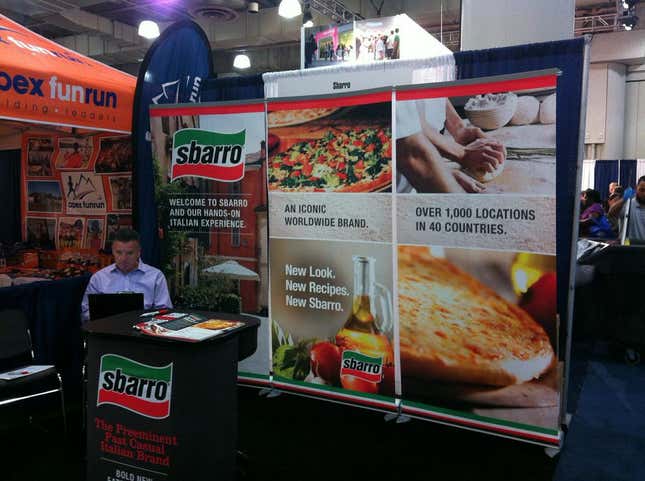
A few weeks ago, franchises took over the Javits Center in Hell's Kitchen for a celebration of entrepreneurship unseen since Tony Robbins brought his fire-walking tent revival to the Meadowlands. For three days, the International Franchise Expo (IFE) brought hundreds of salespeople and tens of thousands of wide-eyed potential investors to the western precipice of Manhattan, in a desolate neighborhood that could use a few franchises itself. Franchisors from around the world, selling everything from hot dogs to duct work, filled a 160,000-square-foot airplane hangar of an exhibit hall with marketing prospectuses and aggressive optimism, ready to put you in a new business today.
Even for the most basic business model, the cost of owning a franchise is upsettingly high. The cheapest food-service business at the IFE required an initial investment of $300,000, while the most expensive just grazed the edge of $1 million—real estate not included. Almost all companies required franchisees to have another $250,000 in liquid assets, to ensure their ability to stay afloat after the store is built. Owners pay a five- to 10-percent royalty on their profits back to the corporation, and make a one- to two-percent contribution to a central marketing fund, with the trust that nationwide brand advertising will boost all the local stores.
Legally, franchisors can't promise specific financial returns. Instead, they build excitement about their concept, that special something that makes this sports bar unique among sports bars, and spin that into an implication of guaranteed success. It's a world of superlatives: Everything is cooked to perfection, award-winning, a crowd favorite. In four hours, I was offered the chance to sell "the coldest beer in America," "Canada's No. 1 comfort food," and the "largest American halal street food concept" from businesses that were virtually indistinguishable. The phrase "world-famous" has never meant less.
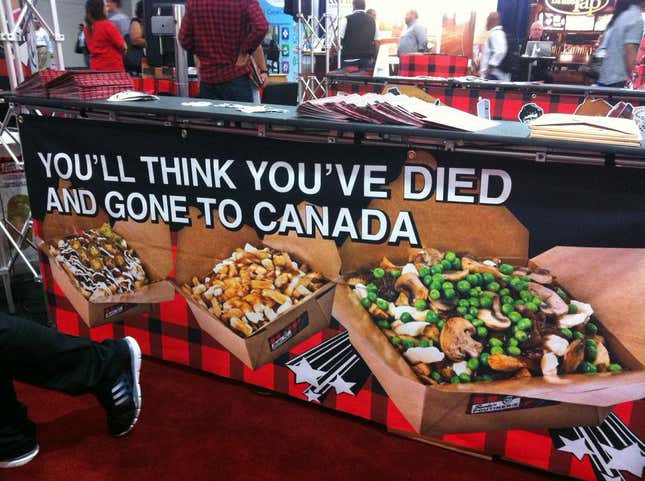
Part of the problem is that most franchise concepts start by capitalizing on known quantities; at the IFE, there were a half-dozen "better burger" chains, the same number of frozen yogurt companies with nonsense names like Llaollao and Smooy, and four different bubble tea businesses, including one trying to "mainstream" their menu by adding chorizo & cheese and Nutella-steamed buns to the usual hoisin duck and pork belly. An industry that sees replicability and homogeneity as the key to success, franchises take the same approach to menu design, carefully plotting out the wacky "signature" dishes (one otherwise unremarkable sports bar boasted a crab-dip-topped soft pretzel) to balance otherwise unremarkable menus.
At the same time, an intrepid few were staking their claim on something brand new, like the Florida-based Churromania, selling nothing but the Mexican donuts, or Smoke's Poutinerie, a Canadian outlet willing to bet that fries topped with gravy and cheese curds will appeal to gluttonous drunks around the world. These aberrations were politely tolerated, but drew nowhere near the crowds of Cici's Pizza or Wayback Burgers.
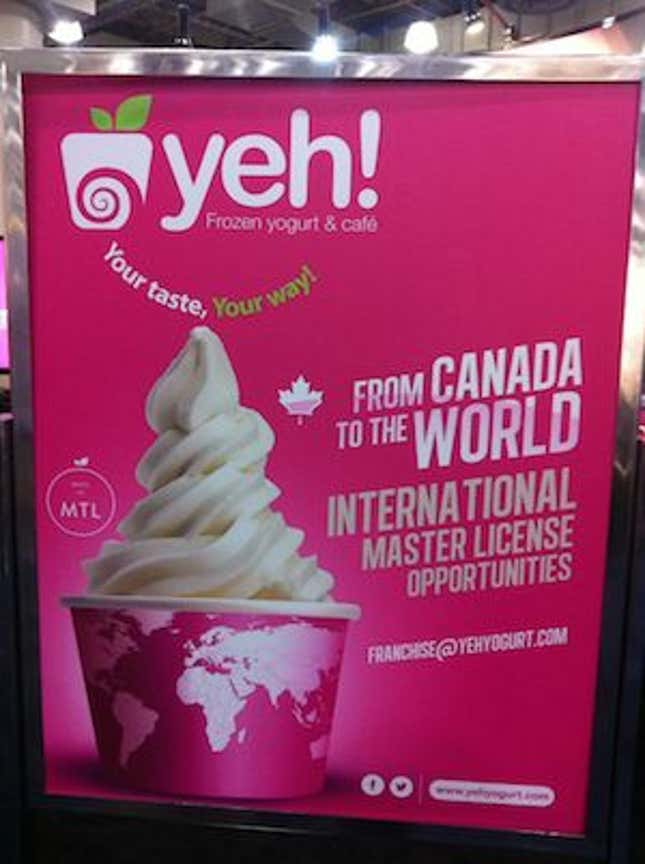
It was one of those oddities that very briefly inspired my own thoughts of drumming up investment capital: 100 Montaditos, a Spanish chain that serves—you guessed it—100 kinds of montadito, tiny sandwiches traditionally stuffed with jamón and other tapas bar favorites. It's a pub concept whose identity isn't founded on waitresses in sexy costumes or having the most HDTV square footage, but on very Spanish attitudes about eating and drinking; slowly, well, and with friends. Florida and the D.C. area have already signed on, and New York's recently opened Greenwich Village location has a respectable four stars on Yelp—and not a protestor in sight.
Still, though, if you've never been to a professional conference, get down on your knees and thank Sheryl Sandberg, Jack Welch, and the pantheon of professional gods. Exhibit halls are fluorescent-lit, recycled-air mausoleums outfitted with padded partitions and vinyl posters. A kind of madness sets in on the third straight eight-hour day inside that beige cavern, living off food-court sandwiches and complimentary coffee. It's a look that says, "I don't know if I'll ever see the sun again, and no, I don't know where the bathrooms are." On Saturday afternoon, IFE exhibitors all had the look.
The prospective franchisees, for their part, were a collection of nervous tics and handshakes, Shakespearean tragedies waiting to happen as franchisors advised them on how to consolidate assets, clean out their 401ks, and optimize loan requests to squeeze the most investment capital from reluctant banks. Entire families roamed the exhibit aisles, placating bored toddlers with handfuls of mini candy bars and frozen yogurt samples while their parents talked royalty fees. Many were recent immigrants, and a number had traveled to New York City from around the country. They were as eager to listen as the sales reps were ready to talk.
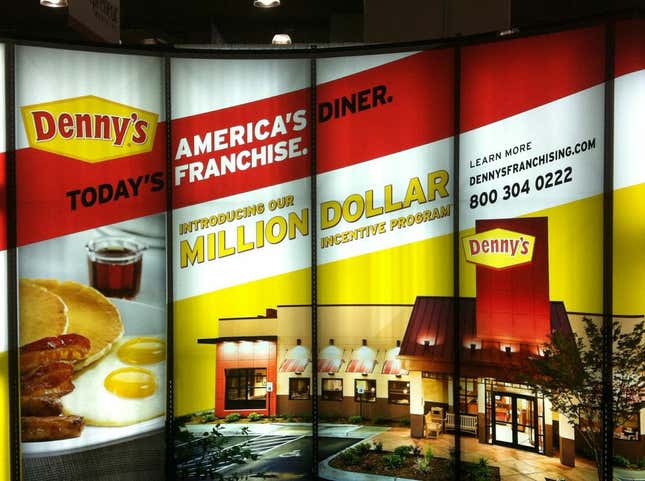
When North Dakota restaurant critic Marilyn Hagerty's Grand Forks Herald review of a newly opened Olive Garden went viral in early 2012, her decision to take the chain seriously was held up for ridicule and amazement, like a genetic oddity in a sideshow. But her rationale for the review was simple: "Olive Garden was waited-for for so long, and it was so welcome." For most of the world, familiarity trumps all else.
It's the case for entrepreneurs, too. Opening a business is scary, especially in food service, where the failure rate hovers around 60 percent in the first five years, and banks are especially reluctant to lend. A franchise offers to do all the hard work for you, bundling the ideas and design and logistics into a package you buy from a nice man in a suit who assures you he's got the magic ingredient that will keep you from ending up a 70-year-old Wal-Mart greeter.
Meanwhile, That Manhattan Dairy Queen has been open for three weeks now. The hysterical press has moved on to their next outrage, and veteran restaurant critic Robert Sietsema has visited and proclaimed the ice cream "at about the same level as Mister Softee, only a bit yellower." In another six months, it will have faded into the city's backdrop, next to the 515 Dunkin Donuts outposts and 467 Subway sandwich joints we've all stopped noticing. In return, our own Shake Shack is thriving in locations from London to Dubai, and the iconic Midtown food cart the Halal Guys just announced their own plans to go global. Better one of these guys opening up on your block than yet another bank.
Regan Hofmann is a food & drinks writer whose work appears at Punch, First We Feast, and whoever else is paying. She has opinions, which she shares on Twitter @regan_hofmann.
Lead illustration by Tara Jacoby; photos by Regan Hofmann.
The Concourse is Deadspin's home for culture/food/whatever coverage. Follow us on Twitter:@DSconcourse.